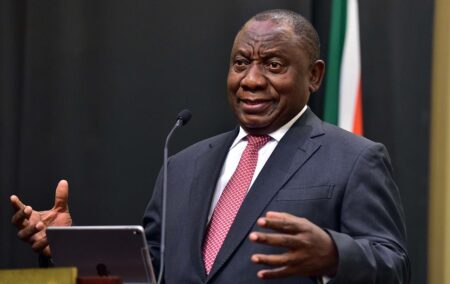President Cyril Ramaphosa has acknowledged that, for ‘some years now’, the country’s state-owned enterprises (SOEs) ‘have mostly been associated in the public eye with state capture, financial mismanagement and inefficiency’ – but insists they remain central to ‘economic and social transformation’.
In his weekly letter, From the desk of the President, Ramaphosa conceded that, in addition to being associated with corruption and mismanagement, and ‘needing regular bailouts from government … some of the ‘biggest and most important state-owned companies have been struggling to meet their mandates’.
But SOEs should be ‘at the forefront of economic and social transformation. They are responsible for providing the infrastructure and the services on which the economy depends, whether it be in the generation of electricity, commuter transport, water provision, freight logistics or telecommunications,’ he said.
‘We firmly believe that public ownership is necessary in critical sectors of the economy and that the country needs robust SOEs that are able to drive economic growth and transformation.’
This was particularly so in the case of delivering ‘public goods such as electricity and water’.
To help them meet their ‘developmental mandate in the public interest as opposed to a purely commercial one’, the government had ‘made it a priority … to turn these companies around, to root out corruption, to improve their governance and to enable them to play the role they should in driving economic growth and employment creation’.
‘To this end, we have embarked upon a number of reforms to strengthen these SOEs so that they can produce the results that the country needs and expects. These reforms are not intended to weaken the public sector or to reduce its role, but to make it a more dynamic and effective part of our economy.’
‘One of the most important reforms is in the energy sector. We have begun the process of restructuring Eskom into three different state-owned entities, responsible for generation, transmission and distribution respectively. This is because the previous structure of Eskom was ill-suited for a changing energy landscape. It had become inefficient and costly and was not sufficiently transparent.
‘The establishment of a transmission entity in particular will mean that Eskom will be able to purchase power from a broader range of providers, both private and public. This will improve transparency, increase competitiveness and promote the purchase of lowest-cost electricity. The result of the changes currently underway will mean that households and businesses should be able to buy electricity at a lower cost and be sure of a reliable supply.
The president said that another ‘critical reform’ was the establishment of the National Ports Authority as an independent subsidiary of Transnet.
‘This a crucial part of Transnet’s broader strategy to revitalise our logistics infrastructure. Transnet plans to invest R100 billion over the next five years in upgrading its infrastructure across the ports system. This will make our ports more efficient and our exports more competitive, and benefit the entire economy.
‘For the ordinary consumer, it will mean reduced prices in the long term for many of our goods. For our exporters, it will mean greater competitiveness in global markets.’
Ramphosa said the government’s policy ‘remains that SOEs must play a crucial developmental role in supporting the growth of our economy. Our task is to place them on a sound footing so that they can serve their ultimate shareholders – the South African people’.
‘This will enable these companies to fulfil the task for which they exist – to foster inclusive economic growth, to promote the creation of jobs across the economy and to ensure all South Africans receive affordable quality services.’

